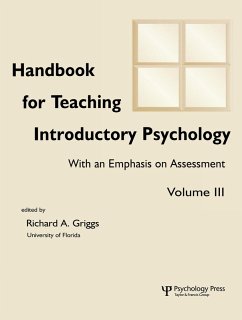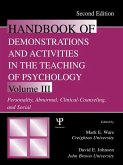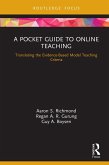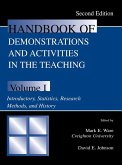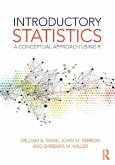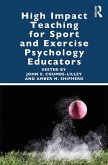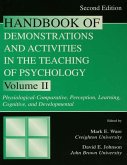Handbook for Teaching Introductory Psychology (eBook, ePUB)
Volume Ii
Redaktion: Hebl, Michelle Rae; Benjamin Jr., Ludy T.; Brewer, Charles L.
34,95 €
34,95 €
inkl. MwSt.
Sofort per Download lieferbar

17 °P sammeln
34,95 €
Als Download kaufen

34,95 €
inkl. MwSt.
Sofort per Download lieferbar

17 °P sammeln
Jetzt verschenken
Alle Infos zum eBook verschenken
34,95 €
inkl. MwSt.
Sofort per Download lieferbar
Alle Infos zum eBook verschenken

17 °P sammeln
Handbook for Teaching Introductory Psychology (eBook, ePUB)
Volume Ii
Redaktion: Hebl, Michelle Rae; Benjamin Jr., Ludy T.; Brewer, Charles L.
- Format: ePub
- Merkliste
- Auf die Merkliste
- Bewerten Bewerten
- Teilen
- Produkt teilen
- Produkterinnerung
- Produkterinnerung

Bitte loggen Sie sich zunächst in Ihr Kundenkonto ein oder registrieren Sie sich bei
bücher.de, um das eBook-Abo tolino select nutzen zu können.
Hier können Sie sich einloggen
Hier können Sie sich einloggen
Sie sind bereits eingeloggt. Klicken Sie auf 2. tolino select Abo, um fortzufahren.

Bitte loggen Sie sich zunächst in Ihr Kundenkonto ein oder registrieren Sie sich bei bücher.de, um das eBook-Abo tolino select nutzen zu können.
Intended for academicians who teach introductory psychology and/or oversee grad assistants who teach the course. The third volume in this series, all articles are new and this volume emphasizes assessment.
- Geräte: eReader
- mit Kopierschutz
- eBook Hilfe
- Größe: 2.21MB
Andere Kunden interessierten sich auch für
![Handbook of Demonstrations and Activities in the Teaching of Psychology (eBook, ePUB) Handbook of Demonstrations and Activities in the Teaching of Psychology (eBook, ePUB)]() Handbook of Demonstrations and Activities in the Teaching of Psychology (eBook, ePUB)61,95 €
Handbook of Demonstrations and Activities in the Teaching of Psychology (eBook, ePUB)61,95 €![A Pocket Guide to Online Teaching (eBook, ePUB) A Pocket Guide to Online Teaching (eBook, ePUB)]() Aaron S. RichmondA Pocket Guide to Online Teaching (eBook, ePUB)20,95 €
Aaron S. RichmondA Pocket Guide to Online Teaching (eBook, ePUB)20,95 €![Handbook of Demonstrations and Activities in the Teaching of Psychology (eBook, ePUB) Handbook of Demonstrations and Activities in the Teaching of Psychology (eBook, ePUB)]() Handbook of Demonstrations and Activities in the Teaching of Psychology (eBook, ePUB)61,95 €
Handbook of Demonstrations and Activities in the Teaching of Psychology (eBook, ePUB)61,95 €![Introductory Statistics (eBook, ePUB) Introductory Statistics (eBook, ePUB)]() William B. WareIntroductory Statistics (eBook, ePUB)114,95 €
William B. WareIntroductory Statistics (eBook, ePUB)114,95 €![High Impact Teaching for Sport and Exercise Psychology Educators (eBook, ePUB) High Impact Teaching for Sport and Exercise Psychology Educators (eBook, ePUB)]() High Impact Teaching for Sport and Exercise Psychology Educators (eBook, ePUB)39,95 €
High Impact Teaching for Sport and Exercise Psychology Educators (eBook, ePUB)39,95 €![Handbook of Demonstrations and Activities in the Teaching of Psychology (eBook, ePUB) Handbook of Demonstrations and Activities in the Teaching of Psychology (eBook, ePUB)]() Handbook of Demonstrations and Activities in the Teaching of Psychology (eBook, ePUB)61,95 €
Handbook of Demonstrations and Activities in the Teaching of Psychology (eBook, ePUB)61,95 €![Handbook for Teaching Statistics and Research Methods (eBook, ePUB) Handbook for Teaching Statistics and Research Methods (eBook, ePUB)]() Handbook for Teaching Statistics and Research Methods (eBook, ePUB)54,95 €
Handbook for Teaching Statistics and Research Methods (eBook, ePUB)54,95 €-
-
-
Intended for academicians who teach introductory psychology and/or oversee grad assistants who teach the course. The third volume in this series, all articles are new and this volume emphasizes assessment.
Dieser Download kann aus rechtlichen Gründen nur mit Rechnungsadresse in A, B, BG, CY, CZ, D, DK, EW, E, FIN, F, GR, HR, H, IRL, I, LT, L, LR, M, NL, PL, P, R, S, SLO, SK ausgeliefert werden.
Produktdetails
- Produktdetails
- Verlag: Taylor & Francis eBooks
- Seitenzahl: 280
- Erscheinungstermin: 1. August 2001
- Englisch
- ISBN-13: 9781135645557
- Artikelnr.: 38263736
- Verlag: Taylor & Francis eBooks
- Seitenzahl: 280
- Erscheinungstermin: 1. August 2001
- Englisch
- ISBN-13: 9781135645557
- Artikelnr.: 38263736
- Herstellerkennzeichnung Die Herstellerinformationen sind derzeit nicht verfügbar.
Michelle Rae Hebl, Charles L. Brewer, Jr. Benjamin, Ludy T.
Contents: Preface. Section I: Issues and Approaches in Teaching Introductory Psychology.Part I: Approaches to the Introductory Course.D. McAdam
Bringing Psychology to Life. D.C. Appleby
Using Psychology Today Articles to Increase the Perceived Relevance of the Introductory Course. N.B.L. Ferguson
Encouraging Responsibility
Active Participation
and Critical Thinking in General Psychology Students. S.W. VanderStoep
A. Fagerlin
J.S. Feenstra
What Do Students Remember From Introductory Psychology? Part II: Students' Interests
Perceptions
and Motives.B. Perlman
L.I. McCann
Student Perspectives on the First Day of Class. A.H. Becker
S.K. Calhoon
What Introductory Psychology Students Attend to on a Course Syllabus. B. Perlman
L.I. McCann
Students' Pet Peeves About Teaching. R.G. Laffitte
Jr.
Effects of Topic Order in Introductory Psychology on Student Achievement
Interest
and Perceived Course Difficulty. W.S. Messer
R.A. Griggs
Student Belief and Involvement in the Paranormal and Performance in Introductory Psychology. W. Weiten
D. Deguara
E. Rehmke
L. Sewall
University
Community College
and High School Students' Evaluations of Textbook Pedagogical Aids. Part III: Students' Knowledge About Psychology.R.A. Griggs
S.E. Ransdell
Misconceptions Tests or Misconceived Tests? H.C. Rickard
R. Rogers
N.R. Ellis
W.B. Beidleman
Some Retention
But Not Enough. M.A. Barnett
Commonsense and Research Findings in Personality. M.A. Barnett
J. Knust
T. McMillan
J. Kaufman
C. Sinisi
Research Findings in Developmental Psychology: Common Sense Revisited. P.A. Lamal
College Students' Misconceptions About Behavior Analysis. R.L. Miller
W.J. Wozniak
M.R. Rust
B.R. Miller
J. Slezak
Counterattitudinal Advocacy as a Means of Enhancing Instructional Effectiveness: How to Teach Students What They Do Not Want to Know. Part IV: Introductory Textbooks: Objective Features.R.A. Griggs
Introductory Psychology Textbooks: Assessing Levels of Difficulty. J.S. Zechmeister
E.B. Zechmeister
Introductory Textbooks and Psychology's Core Concepts. P. Marek
R.A. Griggs
A.N. Christopher
Pedagogical Aids in Textbooks: Do College Students' Perceptions Justify Their Prevalence? R.A. Griggs
S.L. Jackson
P. Marek
A.N. Christopher
Critical Thinking in Introductory Psychology Texts and Supplements. Part V: Introductory Textbooks: Problems.G. Windholz
P.A. Lamal
Kohler's Insight Revisited. R.A. Griggs
Who Is Mrs. Cantlie and Why Are They Doing Those Terrible Things to Her Homunculi? E.J. Letourneau
T.C. Lewis
The Portrayal of Child Sexual Assault in Introductory Psychology Textbooks. Part VI: Examinations: Questions.D.D. Kerkman
K.L. Kellison
M.F. Piñon
D. Schmidt
S. Lewis
The Quiz Game: Writing and Explaining Questions Improve Quiz Scores. P.W. Foos
Effects of Student-Written Questions on Student Test Performance. E.B. Gurman
W.B. Holliman
K. Camperell
Oral Application Questions as a Teaching Strategy. A.F. Nield
M.G. Wintre
Multiple-Choice Questions With an Option to Comment: Student Attitudes and Use. D.K. Dodd
L. Leal
Answer Justification: Removing the "Trick" From Multiple-Choice Questions. K.A. Wollen
R.L. Quackenbush
C.K. Hamlin
The Use of Literal and Applied Test Questions to Assess Understanding of Concepts. Part VII: Examinations: Test Factors Affecting Exam Performance. R.C. Sinclair
A.S. Soldat
M.M. Mark
Affective Cues and Processing Strategy: Color-Coded Examination Forms Influence Performance. W.R. Balch
Item Order Affects Performance on Multiple-Choice Exams. D.L. Neely
F.J. Springston
S.J.H. McCann
Does Item Order Affect Performance on Multiple-Choice Exams? C.A. Grover
A.H. Becker
S.F. Davis
Chapters and Units: Frequent Versus Infrequent Testing Revisited. Part VIII: Examinations: Student Factors Affecting Exam Performance.R.A. Griggs
S.L. Jackson
A Reexamination of the Relationship of High School Psychology and Natural Science Courses to Performance in a College Introductory Psychology Class. D.J. Woehr
T.A. Cavell
Self-Report Measures of Ability
Effort
and Nonacademic Activity as Predictors of Introductory Psychology Test Scores. H.P. Beck
S. Rorrer-Woody
L.G. Pierce
The Relations of Learning and Grade Orientations to Academic Performance. L. Baker
B.R. Lombardi
Students' Lecture Notes and Their Relation to Test Performance. Part IX: Examinations: Feedback.D.M. Carkenord
Assessing the Essay Feedback Technique of Providing an Example of a Full-Credit Answer. L.C. Light
W.J. McKeachie
Y-G. Lin
Self-Scoring: A Self-Monitoring Procedure. H. Friedman
Immediate Feedback
No Return Test Procedure for Introductory Courses. R.A. Smith
R. Wight
Student Evaluation of Friedman's Immediate Feedback
No Return Test Procedure for Introductory Psychology. W.E. Addison
Consequences of Missing Postexam Review Sessions. Part X: Extra Credit.J.C. Norcross
L.J. Horrocks
J.F. Stevenson
Of Barfights and Gadflies: Attitudes and Practices Concerning Extra Credit in College Courses. N. Oley
Extra Credit and Peer Tutoring: Impact on the Quality of Writing in Introductory Psychology in an Open Admissions College. G.W. Hill
IV
J.J. Palladino
J.A. Eison
Blood
Sweat
and Trivia: Faculty Ratings of Extra-Credit Opportunities. J.C. Norcross
H.S. Dooley
J.F. Stevenson
Faculty Use and Justification of Extra Credit: No Middle Ground? E.N. Junn
Empowering the Marginal Student: A Skills-Based Extra-Credit Assignment. Part XI: Academic Dishonesty.S.F. Davis
C.A. Grover
A.H. Becker
L.N. McGregor
Academic Dishonesty: Prevalence
Determinants
Techniques
and Punishments. S.F. Davis
H.W. Ludvigson
Additional Data on Academic Dishonesty and a Proposal for Remediation. F.S. Bellezza
S.F. Bellezza
Detection of Cheating on Multiple-Choice Tests by Using Error-Similarity Analysis. F.S. Bellezza
S.F. Bellezza
Detection of Copying on Multiple-Choice Tests: An Update. M.D. Caron
S.K. Whitbourne
R.P. Halgin
Fraudulent Excuse Making Among College Students. Section II: Demonstrations and Activities in Introductory Psychology.Part XII: General.J. Krauss
A Jigsaw Puzzle Approach to Learning History in Introductory Psychology. J.P. Sheldon
Student-Created Skits: Interactive Class Demonstrations. E.A. Rider
Understanding and Applying Psychology Through Use of News Clippings. T.J. Lawson
The Media Assignment: Enhancing Psychology Students' Ability to Apply Their Knowledge of Psychology. T.M. Osberg
Psychology is Not Just Common Sense: An Introductory Psychology Demonstration. H. Pennington
Excerpts From Journal Articles as Teaching Devices. Part XIII: Research Methods and Statistics.V.A. Kazmerski
D.G. Blasko
Teaching Observational Research in Introductory Psychology: Computerized and Lecture-Based Methods. M.J. Marshall
D.R. Linden
Simulating Clever Hans in the Classroom. B.C. Beins
Using the Barnum Effect to Teach About Ethics and Deception in Research. A. Kohn
Defying Intuition: Demonstrating the Importance of the Empirical Technique. J.A. Bates
Teaching Hypothesis Testing by Debunking a Demonstration of Telepathy. R.A. Ward
A.F. Grasha
Using Astrology to Teach Research Methods to Introductory Psychology Students. Part XIV: Biopsychology. E.R. Harcum
Reaction Time as a Behavioral Demonstr
Bringing Psychology to Life. D.C. Appleby
Using Psychology Today Articles to Increase the Perceived Relevance of the Introductory Course. N.B.L. Ferguson
Encouraging Responsibility
Active Participation
and Critical Thinking in General Psychology Students. S.W. VanderStoep
A. Fagerlin
J.S. Feenstra
What Do Students Remember From Introductory Psychology? Part II: Students' Interests
Perceptions
and Motives.B. Perlman
L.I. McCann
Student Perspectives on the First Day of Class. A.H. Becker
S.K. Calhoon
What Introductory Psychology Students Attend to on a Course Syllabus. B. Perlman
L.I. McCann
Students' Pet Peeves About Teaching. R.G. Laffitte
Jr.
Effects of Topic Order in Introductory Psychology on Student Achievement
Interest
and Perceived Course Difficulty. W.S. Messer
R.A. Griggs
Student Belief and Involvement in the Paranormal and Performance in Introductory Psychology. W. Weiten
D. Deguara
E. Rehmke
L. Sewall
University
Community College
and High School Students' Evaluations of Textbook Pedagogical Aids. Part III: Students' Knowledge About Psychology.R.A. Griggs
S.E. Ransdell
Misconceptions Tests or Misconceived Tests? H.C. Rickard
R. Rogers
N.R. Ellis
W.B. Beidleman
Some Retention
But Not Enough. M.A. Barnett
Commonsense and Research Findings in Personality. M.A. Barnett
J. Knust
T. McMillan
J. Kaufman
C. Sinisi
Research Findings in Developmental Psychology: Common Sense Revisited. P.A. Lamal
College Students' Misconceptions About Behavior Analysis. R.L. Miller
W.J. Wozniak
M.R. Rust
B.R. Miller
J. Slezak
Counterattitudinal Advocacy as a Means of Enhancing Instructional Effectiveness: How to Teach Students What They Do Not Want to Know. Part IV: Introductory Textbooks: Objective Features.R.A. Griggs
Introductory Psychology Textbooks: Assessing Levels of Difficulty. J.S. Zechmeister
E.B. Zechmeister
Introductory Textbooks and Psychology's Core Concepts. P. Marek
R.A. Griggs
A.N. Christopher
Pedagogical Aids in Textbooks: Do College Students' Perceptions Justify Their Prevalence? R.A. Griggs
S.L. Jackson
P. Marek
A.N. Christopher
Critical Thinking in Introductory Psychology Texts and Supplements. Part V: Introductory Textbooks: Problems.G. Windholz
P.A. Lamal
Kohler's Insight Revisited. R.A. Griggs
Who Is Mrs. Cantlie and Why Are They Doing Those Terrible Things to Her Homunculi? E.J. Letourneau
T.C. Lewis
The Portrayal of Child Sexual Assault in Introductory Psychology Textbooks. Part VI: Examinations: Questions.D.D. Kerkman
K.L. Kellison
M.F. Piñon
D. Schmidt
S. Lewis
The Quiz Game: Writing and Explaining Questions Improve Quiz Scores. P.W. Foos
Effects of Student-Written Questions on Student Test Performance. E.B. Gurman
W.B. Holliman
K. Camperell
Oral Application Questions as a Teaching Strategy. A.F. Nield
M.G. Wintre
Multiple-Choice Questions With an Option to Comment: Student Attitudes and Use. D.K. Dodd
L. Leal
Answer Justification: Removing the "Trick" From Multiple-Choice Questions. K.A. Wollen
R.L. Quackenbush
C.K. Hamlin
The Use of Literal and Applied Test Questions to Assess Understanding of Concepts. Part VII: Examinations: Test Factors Affecting Exam Performance. R.C. Sinclair
A.S. Soldat
M.M. Mark
Affective Cues and Processing Strategy: Color-Coded Examination Forms Influence Performance. W.R. Balch
Item Order Affects Performance on Multiple-Choice Exams. D.L. Neely
F.J. Springston
S.J.H. McCann
Does Item Order Affect Performance on Multiple-Choice Exams? C.A. Grover
A.H. Becker
S.F. Davis
Chapters and Units: Frequent Versus Infrequent Testing Revisited. Part VIII: Examinations: Student Factors Affecting Exam Performance.R.A. Griggs
S.L. Jackson
A Reexamination of the Relationship of High School Psychology and Natural Science Courses to Performance in a College Introductory Psychology Class. D.J. Woehr
T.A. Cavell
Self-Report Measures of Ability
Effort
and Nonacademic Activity as Predictors of Introductory Psychology Test Scores. H.P. Beck
S. Rorrer-Woody
L.G. Pierce
The Relations of Learning and Grade Orientations to Academic Performance. L. Baker
B.R. Lombardi
Students' Lecture Notes and Their Relation to Test Performance. Part IX: Examinations: Feedback.D.M. Carkenord
Assessing the Essay Feedback Technique of Providing an Example of a Full-Credit Answer. L.C. Light
W.J. McKeachie
Y-G. Lin
Self-Scoring: A Self-Monitoring Procedure. H. Friedman
Immediate Feedback
No Return Test Procedure for Introductory Courses. R.A. Smith
R. Wight
Student Evaluation of Friedman's Immediate Feedback
No Return Test Procedure for Introductory Psychology. W.E. Addison
Consequences of Missing Postexam Review Sessions. Part X: Extra Credit.J.C. Norcross
L.J. Horrocks
J.F. Stevenson
Of Barfights and Gadflies: Attitudes and Practices Concerning Extra Credit in College Courses. N. Oley
Extra Credit and Peer Tutoring: Impact on the Quality of Writing in Introductory Psychology in an Open Admissions College. G.W. Hill
IV
J.J. Palladino
J.A. Eison
Blood
Sweat
and Trivia: Faculty Ratings of Extra-Credit Opportunities. J.C. Norcross
H.S. Dooley
J.F. Stevenson
Faculty Use and Justification of Extra Credit: No Middle Ground? E.N. Junn
Empowering the Marginal Student: A Skills-Based Extra-Credit Assignment. Part XI: Academic Dishonesty.S.F. Davis
C.A. Grover
A.H. Becker
L.N. McGregor
Academic Dishonesty: Prevalence
Determinants
Techniques
and Punishments. S.F. Davis
H.W. Ludvigson
Additional Data on Academic Dishonesty and a Proposal for Remediation. F.S. Bellezza
S.F. Bellezza
Detection of Cheating on Multiple-Choice Tests by Using Error-Similarity Analysis. F.S. Bellezza
S.F. Bellezza
Detection of Copying on Multiple-Choice Tests: An Update. M.D. Caron
S.K. Whitbourne
R.P. Halgin
Fraudulent Excuse Making Among College Students. Section II: Demonstrations and Activities in Introductory Psychology.Part XII: General.J. Krauss
A Jigsaw Puzzle Approach to Learning History in Introductory Psychology. J.P. Sheldon
Student-Created Skits: Interactive Class Demonstrations. E.A. Rider
Understanding and Applying Psychology Through Use of News Clippings. T.J. Lawson
The Media Assignment: Enhancing Psychology Students' Ability to Apply Their Knowledge of Psychology. T.M. Osberg
Psychology is Not Just Common Sense: An Introductory Psychology Demonstration. H. Pennington
Excerpts From Journal Articles as Teaching Devices. Part XIII: Research Methods and Statistics.V.A. Kazmerski
D.G. Blasko
Teaching Observational Research in Introductory Psychology: Computerized and Lecture-Based Methods. M.J. Marshall
D.R. Linden
Simulating Clever Hans in the Classroom. B.C. Beins
Using the Barnum Effect to Teach About Ethics and Deception in Research. A. Kohn
Defying Intuition: Demonstrating the Importance of the Empirical Technique. J.A. Bates
Teaching Hypothesis Testing by Debunking a Demonstration of Telepathy. R.A. Ward
A.F. Grasha
Using Astrology to Teach Research Methods to Introductory Psychology Students. Part XIV: Biopsychology. E.R. Harcum
Reaction Time as a Behavioral Demonstr
Contents: Preface. Section I: Issues and Approaches in Teaching Introductory Psychology.Part I: Approaches to the Introductory Course.D. McAdam
Bringing Psychology to Life. D.C. Appleby
Using Psychology Today Articles to Increase the Perceived Relevance of the Introductory Course. N.B.L. Ferguson
Encouraging Responsibility
Active Participation
and Critical Thinking in General Psychology Students. S.W. VanderStoep
A. Fagerlin
J.S. Feenstra
What Do Students Remember From Introductory Psychology? Part II: Students' Interests
Perceptions
and Motives.B. Perlman
L.I. McCann
Student Perspectives on the First Day of Class. A.H. Becker
S.K. Calhoon
What Introductory Psychology Students Attend to on a Course Syllabus. B. Perlman
L.I. McCann
Students' Pet Peeves About Teaching. R.G. Laffitte
Jr.
Effects of Topic Order in Introductory Psychology on Student Achievement
Interest
and Perceived Course Difficulty. W.S. Messer
R.A. Griggs
Student Belief and Involvement in the Paranormal and Performance in Introductory Psychology. W. Weiten
D. Deguara
E. Rehmke
L. Sewall
University
Community College
and High School Students' Evaluations of Textbook Pedagogical Aids. Part III: Students' Knowledge About Psychology.R.A. Griggs
S.E. Ransdell
Misconceptions Tests or Misconceived Tests? H.C. Rickard
R. Rogers
N.R. Ellis
W.B. Beidleman
Some Retention
But Not Enough. M.A. Barnett
Commonsense and Research Findings in Personality. M.A. Barnett
J. Knust
T. McMillan
J. Kaufman
C. Sinisi
Research Findings in Developmental Psychology: Common Sense Revisited. P.A. Lamal
College Students' Misconceptions About Behavior Analysis. R.L. Miller
W.J. Wozniak
M.R. Rust
B.R. Miller
J. Slezak
Counterattitudinal Advocacy as a Means of Enhancing Instructional Effectiveness: How to Teach Students What They Do Not Want to Know. Part IV: Introductory Textbooks: Objective Features.R.A. Griggs
Introductory Psychology Textbooks: Assessing Levels of Difficulty. J.S. Zechmeister
E.B. Zechmeister
Introductory Textbooks and Psychology's Core Concepts. P. Marek
R.A. Griggs
A.N. Christopher
Pedagogical Aids in Textbooks: Do College Students' Perceptions Justify Their Prevalence? R.A. Griggs
S.L. Jackson
P. Marek
A.N. Christopher
Critical Thinking in Introductory Psychology Texts and Supplements. Part V: Introductory Textbooks: Problems.G. Windholz
P.A. Lamal
Kohler's Insight Revisited. R.A. Griggs
Who Is Mrs. Cantlie and Why Are They Doing Those Terrible Things to Her Homunculi? E.J. Letourneau
T.C. Lewis
The Portrayal of Child Sexual Assault in Introductory Psychology Textbooks. Part VI: Examinations: Questions.D.D. Kerkman
K.L. Kellison
M.F. Piñon
D. Schmidt
S. Lewis
The Quiz Game: Writing and Explaining Questions Improve Quiz Scores. P.W. Foos
Effects of Student-Written Questions on Student Test Performance. E.B. Gurman
W.B. Holliman
K. Camperell
Oral Application Questions as a Teaching Strategy. A.F. Nield
M.G. Wintre
Multiple-Choice Questions With an Option to Comment: Student Attitudes and Use. D.K. Dodd
L. Leal
Answer Justification: Removing the "Trick" From Multiple-Choice Questions. K.A. Wollen
R.L. Quackenbush
C.K. Hamlin
The Use of Literal and Applied Test Questions to Assess Understanding of Concepts. Part VII: Examinations: Test Factors Affecting Exam Performance. R.C. Sinclair
A.S. Soldat
M.M. Mark
Affective Cues and Processing Strategy: Color-Coded Examination Forms Influence Performance. W.R. Balch
Item Order Affects Performance on Multiple-Choice Exams. D.L. Neely
F.J. Springston
S.J.H. McCann
Does Item Order Affect Performance on Multiple-Choice Exams? C.A. Grover
A.H. Becker
S.F. Davis
Chapters and Units: Frequent Versus Infrequent Testing Revisited. Part VIII: Examinations: Student Factors Affecting Exam Performance.R.A. Griggs
S.L. Jackson
A Reexamination of the Relationship of High School Psychology and Natural Science Courses to Performance in a College Introductory Psychology Class. D.J. Woehr
T.A. Cavell
Self-Report Measures of Ability
Effort
and Nonacademic Activity as Predictors of Introductory Psychology Test Scores. H.P. Beck
S. Rorrer-Woody
L.G. Pierce
The Relations of Learning and Grade Orientations to Academic Performance. L. Baker
B.R. Lombardi
Students' Lecture Notes and Their Relation to Test Performance. Part IX: Examinations: Feedback.D.M. Carkenord
Assessing the Essay Feedback Technique of Providing an Example of a Full-Credit Answer. L.C. Light
W.J. McKeachie
Y-G. Lin
Self-Scoring: A Self-Monitoring Procedure. H. Friedman
Immediate Feedback
No Return Test Procedure for Introductory Courses. R.A. Smith
R. Wight
Student Evaluation of Friedman's Immediate Feedback
No Return Test Procedure for Introductory Psychology. W.E. Addison
Consequences of Missing Postexam Review Sessions. Part X: Extra Credit.J.C. Norcross
L.J. Horrocks
J.F. Stevenson
Of Barfights and Gadflies: Attitudes and Practices Concerning Extra Credit in College Courses. N. Oley
Extra Credit and Peer Tutoring: Impact on the Quality of Writing in Introductory Psychology in an Open Admissions College. G.W. Hill
IV
J.J. Palladino
J.A. Eison
Blood
Sweat
and Trivia: Faculty Ratings of Extra-Credit Opportunities. J.C. Norcross
H.S. Dooley
J.F. Stevenson
Faculty Use and Justification of Extra Credit: No Middle Ground? E.N. Junn
Empowering the Marginal Student: A Skills-Based Extra-Credit Assignment. Part XI: Academic Dishonesty.S.F. Davis
C.A. Grover
A.H. Becker
L.N. McGregor
Academic Dishonesty: Prevalence
Determinants
Techniques
and Punishments. S.F. Davis
H.W. Ludvigson
Additional Data on Academic Dishonesty and a Proposal for Remediation. F.S. Bellezza
S.F. Bellezza
Detection of Cheating on Multiple-Choice Tests by Using Error-Similarity Analysis. F.S. Bellezza
S.F. Bellezza
Detection of Copying on Multiple-Choice Tests: An Update. M.D. Caron
S.K. Whitbourne
R.P. Halgin
Fraudulent Excuse Making Among College Students. Section II: Demonstrations and Activities in Introductory Psychology.Part XII: General.J. Krauss
A Jigsaw Puzzle Approach to Learning History in Introductory Psychology. J.P. Sheldon
Student-Created Skits: Interactive Class Demonstrations. E.A. Rider
Understanding and Applying Psychology Through Use of News Clippings. T.J. Lawson
The Media Assignment: Enhancing Psychology Students' Ability to Apply Their Knowledge of Psychology. T.M. Osberg
Psychology is Not Just Common Sense: An Introductory Psychology Demonstration. H. Pennington
Excerpts From Journal Articles as Teaching Devices. Part XIII: Research Methods and Statistics.V.A. Kazmerski
D.G. Blasko
Teaching Observational Research in Introductory Psychology: Computerized and Lecture-Based Methods. M.J. Marshall
D.R. Linden
Simulating Clever Hans in the Classroom. B.C. Beins
Using the Barnum Effect to Teach About Ethics and Deception in Research. A. Kohn
Defying Intuition: Demonstrating the Importance of the Empirical Technique. J.A. Bates
Teaching Hypothesis Testing by Debunking a Demonstration of Telepathy. R.A. Ward
A.F. Grasha
Using Astrology to Teach Research Methods to Introductory Psychology Students. Part XIV: Biopsychology. E.R. Harcum
Reaction Time as a Behavioral Demonstr
Bringing Psychology to Life. D.C. Appleby
Using Psychology Today Articles to Increase the Perceived Relevance of the Introductory Course. N.B.L. Ferguson
Encouraging Responsibility
Active Participation
and Critical Thinking in General Psychology Students. S.W. VanderStoep
A. Fagerlin
J.S. Feenstra
What Do Students Remember From Introductory Psychology? Part II: Students' Interests
Perceptions
and Motives.B. Perlman
L.I. McCann
Student Perspectives on the First Day of Class. A.H. Becker
S.K. Calhoon
What Introductory Psychology Students Attend to on a Course Syllabus. B. Perlman
L.I. McCann
Students' Pet Peeves About Teaching. R.G. Laffitte
Jr.
Effects of Topic Order in Introductory Psychology on Student Achievement
Interest
and Perceived Course Difficulty. W.S. Messer
R.A. Griggs
Student Belief and Involvement in the Paranormal and Performance in Introductory Psychology. W. Weiten
D. Deguara
E. Rehmke
L. Sewall
University
Community College
and High School Students' Evaluations of Textbook Pedagogical Aids. Part III: Students' Knowledge About Psychology.R.A. Griggs
S.E. Ransdell
Misconceptions Tests or Misconceived Tests? H.C. Rickard
R. Rogers
N.R. Ellis
W.B. Beidleman
Some Retention
But Not Enough. M.A. Barnett
Commonsense and Research Findings in Personality. M.A. Barnett
J. Knust
T. McMillan
J. Kaufman
C. Sinisi
Research Findings in Developmental Psychology: Common Sense Revisited. P.A. Lamal
College Students' Misconceptions About Behavior Analysis. R.L. Miller
W.J. Wozniak
M.R. Rust
B.R. Miller
J. Slezak
Counterattitudinal Advocacy as a Means of Enhancing Instructional Effectiveness: How to Teach Students What They Do Not Want to Know. Part IV: Introductory Textbooks: Objective Features.R.A. Griggs
Introductory Psychology Textbooks: Assessing Levels of Difficulty. J.S. Zechmeister
E.B. Zechmeister
Introductory Textbooks and Psychology's Core Concepts. P. Marek
R.A. Griggs
A.N. Christopher
Pedagogical Aids in Textbooks: Do College Students' Perceptions Justify Their Prevalence? R.A. Griggs
S.L. Jackson
P. Marek
A.N. Christopher
Critical Thinking in Introductory Psychology Texts and Supplements. Part V: Introductory Textbooks: Problems.G. Windholz
P.A. Lamal
Kohler's Insight Revisited. R.A. Griggs
Who Is Mrs. Cantlie and Why Are They Doing Those Terrible Things to Her Homunculi? E.J. Letourneau
T.C. Lewis
The Portrayal of Child Sexual Assault in Introductory Psychology Textbooks. Part VI: Examinations: Questions.D.D. Kerkman
K.L. Kellison
M.F. Piñon
D. Schmidt
S. Lewis
The Quiz Game: Writing and Explaining Questions Improve Quiz Scores. P.W. Foos
Effects of Student-Written Questions on Student Test Performance. E.B. Gurman
W.B. Holliman
K. Camperell
Oral Application Questions as a Teaching Strategy. A.F. Nield
M.G. Wintre
Multiple-Choice Questions With an Option to Comment: Student Attitudes and Use. D.K. Dodd
L. Leal
Answer Justification: Removing the "Trick" From Multiple-Choice Questions. K.A. Wollen
R.L. Quackenbush
C.K. Hamlin
The Use of Literal and Applied Test Questions to Assess Understanding of Concepts. Part VII: Examinations: Test Factors Affecting Exam Performance. R.C. Sinclair
A.S. Soldat
M.M. Mark
Affective Cues and Processing Strategy: Color-Coded Examination Forms Influence Performance. W.R. Balch
Item Order Affects Performance on Multiple-Choice Exams. D.L. Neely
F.J. Springston
S.J.H. McCann
Does Item Order Affect Performance on Multiple-Choice Exams? C.A. Grover
A.H. Becker
S.F. Davis
Chapters and Units: Frequent Versus Infrequent Testing Revisited. Part VIII: Examinations: Student Factors Affecting Exam Performance.R.A. Griggs
S.L. Jackson
A Reexamination of the Relationship of High School Psychology and Natural Science Courses to Performance in a College Introductory Psychology Class. D.J. Woehr
T.A. Cavell
Self-Report Measures of Ability
Effort
and Nonacademic Activity as Predictors of Introductory Psychology Test Scores. H.P. Beck
S. Rorrer-Woody
L.G. Pierce
The Relations of Learning and Grade Orientations to Academic Performance. L. Baker
B.R. Lombardi
Students' Lecture Notes and Their Relation to Test Performance. Part IX: Examinations: Feedback.D.M. Carkenord
Assessing the Essay Feedback Technique of Providing an Example of a Full-Credit Answer. L.C. Light
W.J. McKeachie
Y-G. Lin
Self-Scoring: A Self-Monitoring Procedure. H. Friedman
Immediate Feedback
No Return Test Procedure for Introductory Courses. R.A. Smith
R. Wight
Student Evaluation of Friedman's Immediate Feedback
No Return Test Procedure for Introductory Psychology. W.E. Addison
Consequences of Missing Postexam Review Sessions. Part X: Extra Credit.J.C. Norcross
L.J. Horrocks
J.F. Stevenson
Of Barfights and Gadflies: Attitudes and Practices Concerning Extra Credit in College Courses. N. Oley
Extra Credit and Peer Tutoring: Impact on the Quality of Writing in Introductory Psychology in an Open Admissions College. G.W. Hill
IV
J.J. Palladino
J.A. Eison
Blood
Sweat
and Trivia: Faculty Ratings of Extra-Credit Opportunities. J.C. Norcross
H.S. Dooley
J.F. Stevenson
Faculty Use and Justification of Extra Credit: No Middle Ground? E.N. Junn
Empowering the Marginal Student: A Skills-Based Extra-Credit Assignment. Part XI: Academic Dishonesty.S.F. Davis
C.A. Grover
A.H. Becker
L.N. McGregor
Academic Dishonesty: Prevalence
Determinants
Techniques
and Punishments. S.F. Davis
H.W. Ludvigson
Additional Data on Academic Dishonesty and a Proposal for Remediation. F.S. Bellezza
S.F. Bellezza
Detection of Cheating on Multiple-Choice Tests by Using Error-Similarity Analysis. F.S. Bellezza
S.F. Bellezza
Detection of Copying on Multiple-Choice Tests: An Update. M.D. Caron
S.K. Whitbourne
R.P. Halgin
Fraudulent Excuse Making Among College Students. Section II: Demonstrations and Activities in Introductory Psychology.Part XII: General.J. Krauss
A Jigsaw Puzzle Approach to Learning History in Introductory Psychology. J.P. Sheldon
Student-Created Skits: Interactive Class Demonstrations. E.A. Rider
Understanding and Applying Psychology Through Use of News Clippings. T.J. Lawson
The Media Assignment: Enhancing Psychology Students' Ability to Apply Their Knowledge of Psychology. T.M. Osberg
Psychology is Not Just Common Sense: An Introductory Psychology Demonstration. H. Pennington
Excerpts From Journal Articles as Teaching Devices. Part XIII: Research Methods and Statistics.V.A. Kazmerski
D.G. Blasko
Teaching Observational Research in Introductory Psychology: Computerized and Lecture-Based Methods. M.J. Marshall
D.R. Linden
Simulating Clever Hans in the Classroom. B.C. Beins
Using the Barnum Effect to Teach About Ethics and Deception in Research. A. Kohn
Defying Intuition: Demonstrating the Importance of the Empirical Technique. J.A. Bates
Teaching Hypothesis Testing by Debunking a Demonstration of Telepathy. R.A. Ward
A.F. Grasha
Using Astrology to Teach Research Methods to Introductory Psychology Students. Part XIV: Biopsychology. E.R. Harcum
Reaction Time as a Behavioral Demonstr
